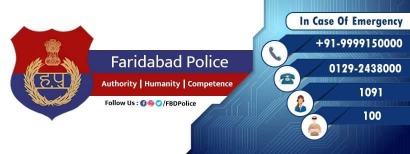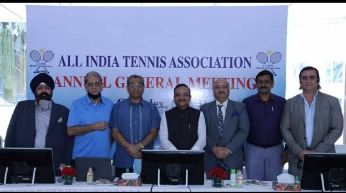BY: Santosh Mehta
From Botany in Hansraj College to diploma in administrative law at the Indian law Institute Bhagwandas Road in Delhi and thereafter being the Principal District and Sessions Judge, Poonam A Bamba has tried to alter legal history by introducing new chapter in deliverance of justice and jurisprudence- the crusade is not over- seems to be continuing the crusade for the last man on the street, be it domestic violence or custody battles between parents for their children.

By the new emerging definition, every place of physical or mental activity is a workplace. No doubt, Poonam will throw up many more challenges before the courts and lawmakers to help all to serve India better.
She has practised as an Advocate in Delhi district courts and High courts for almost five years.(1983-87). Worked as law officer/deputy chief Officer(Law) with Punjab National and central bank respectively from 1987 to 1996.
Afterwards, she worked with the securities exchange board of India (SEBI), Mumbai as division chief . Legal and joint legal adviser from 1996 to2002 and represented Sebi before securities Appellate tribunal , Mumbai, Bombay High court and other courts in India. She has joined judiciary in Delhi higher judicial services as of 2002. She has also worked as Adj /matrimonial court in Tis Hazari courts in 2003 -2006.
Later on she has worked as ADJ/land acquisition court and also dealt with Appeals under the public premises(Eviction of unauthorised occupants)Act 1971 at same court Tis Hazari in which she has dealt with matrimonial cases. After working in these courts then she posted as additional sessions judge in patiala house court from 2008 -2010. After working as a Judge, she has also dealt with POSCO cases while posted as Additional Judge in Patiala House.
After serving in various positions, she has also served as Principal Judge in family courts in Saket from 2016 now, she is posted as a district & sessions judge in 2017.
Besides all these ,Poonam is a keen observer of life and nature and evinces special interest in dynamics of human relationship.
Poonam has recently come into headlines after she wrote a book on “Parents At War”: Custody Battles In Indian Courts and the book is published by Vitasta publisher. As a writer , she has given true examples of famous actors such as Naseeruddin Shah when his son got admission in the school and school authorities gave him a form to fill but he left one column blank which needs to write about his son religion and he told the school authorities that his son will decide about his religion because he is a Musslim married with Rana Pathak whos Hindu. However, he did not impose Islam or Hinduism on his son
She also gave another example of Nobel laureate Kailash Satyarthi of Bachpan Bachao who provided and rescued millions of children. He said that you may address the children’s problems and provide for their future but you can never restore their childhood. Once lost, it’s lost forever.
Besides these two interesting real life examples, she gave tge instance of famous Hollywood actress Angelina Jolie who has filed a case against his husband, wherein the judge dealing with custody rights in her divorce case filed by Angelina Jolie against Brad Pitt, asked her to ensure that their kids’ relationship with their father was not disturbed. A leading daily reported that the concerned judge while observing that it was critical for the children to have a healthy relationship with their parents, ordered Angelina to give the cell phone numbers of their six children to Brad so that he could call whenever he wanted.
After she wrote her latest book ‘Parents At War: Custody Battles In Indian Courts. Parents at war shares real-life stories of children caught up in the warfare between litigating parents, bringing to the fore the plight of children who bear the burnt of such contests and undergo deep trauma due to parental bickering and tug of war.
The book also shares the predicament the judges face while balancing delicately the interests of all the stakeholders and ensuring the welfare of children. It brings to light how unknowingly,the parents, in their zeal to win custody, scar the children forever,. Children not only suffer psychological trauma, but also have phsyical manifestaions like stunted growth, obesity, nausea, aches and pain etc. Whether the mother lands the custody or the father, there is no winner here because its the child who loses on love, affaction, and care of a parent and also the extended family.
The book also touches upon the issue of insincere custody litigation with hidden agenda.
After she wrote this interesting book, SANTOSH MEHTA interviewed her.
Q.1 According to Minister of Law Mr Ravi Shankar Prasad, there are only 73 Women Judges in India’s High Courts. But only you have written a book on Parents At War: ‘Custody Battles in Indian Courts’. How have you thought about writing a book on this subject?
Ans. I am not a High Court Judge. I am presently posted as Principal District & Sessions Judge (South), Saket. I am not aware whether there are 73 Women Judges in Indian High Courts. I am also not aware if any other District and Session Judges or High Court Judge has written a book on the subject.
As far as my motivation for writing this book is concerned, while presiding over matrimonial court and family courts for about seven years, I was faced with the fate of children caught up in the warfare of parents. It was painful to see children being pulled apart; and these poignant tales of despair and trauma faced by children of broken or breaking marriages, were the motivation behind this work.
Q: Do you think that mostly children are the sufferers due to parents separation or fight?
A: Yes, it’s true that children who are the worst sufferers fight between their parents and undergo trauma and carry these wounds for lifetime and are scarred forever. Having dealt with such children, I felt ordained to share their stories with everyone and particularly the parents who unknowingly heap pain and trauma on the children, whose welfare they claim to be the only reason for their seeking of custody.
This book is also an endeavour to mirror the concerns of other stakeholders as well i.e. custodial and non-custodial parents, the society etc.
Q. Before your posting as a Principal Judge, you have worked in various capacities, such as a Law Officer and as a lawyer in the Supreme Court, High Court and Patiala House etc. Which of these jobs was your favorite?
A: I never practiced in Supreme Court; I practiced as an Advocate in District Courts and High Court of Delhi, before working with banks and the Securities Market Regulator, SEBI. Every job was a new learning and provided a different kind of exposure. Of course, working in the judiciary provided a wide spectrum of work, dealing with different laws and a variety of cases, life situations and litigants. It is also a God sent opportunity to serve and touch people’s lives so directly.
Q. How long did it take you to write a book?
A: I had been maintaining a daily journal and collated my experiences recorded in the same over a period of 5 years. So you can say that it took me about 5 years to complete this book.
Q: Did you face any problem while writing this book?
A: Not really. Though it did require a lot of energy to give shape to the daily experiences and present them in story form.
Q. As a woman Principal Judge, do you face any particular challenges?
A: No, Not really.
Q : How difficult is it to Judge an accused, be it a mother or father of a child?
A: The litigating parents are addressed as ‘parties’ and not as ‘accused’. Of course it gets difficult to an extent that both the parents claim that they can provide a better life to the child; and have better resources and can provide a better environment to the child for her holistic growth. In that backdrop, a Family Court Judge has to weigh and balance various interests while staying focused to assess the welfare of a child, which is of paramount importance.
Q. What suggestions would you like to give to the Government and parents so that such cases will be less?
A: There cannot be any suggestions to reduce such cases. As the society is evolving, every individual feels more entitled. The shift to materialism and individualism, everyone is claiming his/her own space. We are watching increase in break up of families and rise in divorce cases, the outcome of which is more claims/cases for custody of the child by both the parents. This is the phenomenon or a stage which a growing society passes through.
Q. Are the stories in your book and the names are real?
A. No. Not only the names but even the gender and other details of the cases have been moulded in a manner to ensure that the identity of the persons involved is not revealed in any manner whatsoever.
Q.Have you taken permission for using their stories and publishing in a book?
A The stories have been fictionalized and the identities of the persons have been camouflaged and bear no resemblance to the real cases.
Q. Any valuable tips for readers who are parents?
Tips for readers/ parents/other stakeholders are summarised at the end of each story. I would only like to mention that litigating parents while claiming custody of the child should keep in mind only the interest of the child and should keep aside their own conflicts and hurt with the spouse.
Q. Your work keeps you busy. How do you spend time with your family?
A I feel it’s only how you prioritise. Writing helps me connect with myself and is an expression of my life purpose. Writing keeps me motivated and in the best of spirits which helps me spend quality time with my family members.














